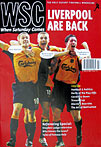 Africa's ambition of hosting the World Cup lies in ruins, writes Alan Duncan
Africa's ambition of hosting the World Cup lies in ruins, writes Alan Duncan
The wailing outside Accra’s Military Hospital in the hours after the May 9 clash between Ghanaian giants Asante Kotoko and Hearts of Oak confirmed the worst – 126 fans killed following a stampede sparked by security forces who had fired volleys of tear gas into the popular Ade Coker Stand.
Africa’s worst ever football disaster was the continent’s fourth such tragedy in as many weeks. On April 11, 43 fans were killed at South Africa’s Ellis Park stadium following a stampede. Seven more perished in a similar incident in Lubumbashi, DR Congo, on April 29. Barely a week passed and one fan was recorded dead and 39 injured when fighting broke out between rival fans in Ivory Coast.
That the Ghanaian authorities had made every effort not to add to the growing epidemic offers little solace. Leaflets were published urging calm in what is traditionally the most volatile fixture of the season. Extra security was laid on and ticket sales were restricted. The identity of the referee was only disclosed minutes before kick-off.
Whereas the Ellis Park disaster was reportedly caused by overcrowding, the Ghanaians had taken every care to ensure that the gates were closed once the prescribed numbers had entered the ground. The death-trap was set, albeit inadvertently. The buckled iron fence, the scattered debris of plastic sandals, trainers and shreds of clothes lying by what should have been an open exit gate, served only to compound the sense of injustice meted out to those who had paid little more than £2.50 for the event that was to cause their death.
Fearful of a major public backlash, Ghana’s president John Kufuor announced three days of national mourning. Police chief Ernest Owusu-Poku has since banned the use of tear gas and was adamant there would be justice: “The administration will not shield or protect anybody whom the committee of inquiry may find guilty.”
The Confederation of African Football can force national associations to institute bans on stadiums, but has previously balked at the idea. However, an urgently convened CAF executive meeting in Johannesburg on May 23 indicated a tough new stance with the announcement that Zimbabwe’s Barbourfields Stadium would be banned indefinitely following violent scenes in a recent African Champions’ League match.
Yet Africa has vastly contrasting degrees of development, political and economic stability, which make the blanket implementation of preventative measures almost impossible. Instead, the onus will fall on Africa’s 2010 World Cup hopefuls, Morocco and South Africa, to make security a priority. For CAF, the flagship 2002 Nations Cup in Mali, whose organising committee has already banned the use of tear gas, will take on extra significance.
Sadly, the question of whether Africa will host the World Cup begins to have the same resonance as whether South Africa would degenerate into anarchy following the end of apartheid. For the quest of African football is no less a march for freedom – from corruption, from mismanagement, from the poverty which compromises values.
From WSC 173 July 2001. What was happening this month